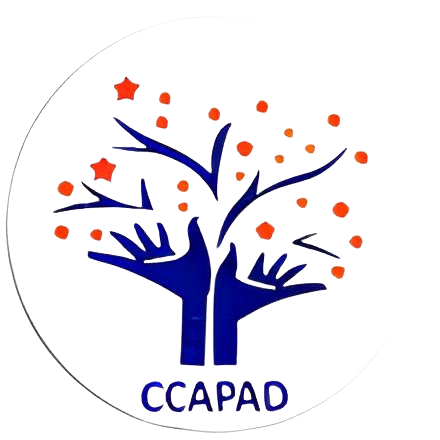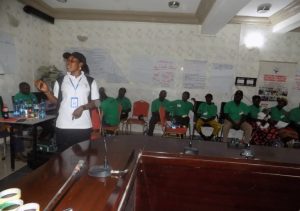PROJECT NUMBER: A-NGA-2021-0027
- Introduction/Objective
The Centre for Community Actions for Peace and Development (CCAPAD) located in Jos, the Plateau State of Nigeria, is a Non-governmental, Non-profit making Organisation established in 2010 and officially registered with the Corporate Affairs Commission (CACAT NO 97004) and the Economic and Financial Crimes Commission (EFCC) of the Federal Republic of Nigeria in 2016. A year later, CCAPAD became fully registered with the American Data and Universal Numbering System, with a unique DUNS Identification Number 561295835 and European Union PADOR number NG – 2020 – DSQ – 2708430988. CCAPAD as an interfaith organization by set up, is dignified to serve as a connecting point and platform for all the Community Development Associations (CDAs), especially the conflict-prone communities to constructively discuss their challenges and resolve them non-violently. Aside the 4-year remarkable partnership with the Mennonite Central Committee MCC/TMH Canada, CCAPAD had partnered with the Nexus Fund-USA, USAID-NERI, Global Centre on Cooperative Security-UK, Care-fronting, LAF-UK, British Council, Bread for the World-Germany among other funders to intervene in other states and on varying subject matters.
- Background
With funding from the BMZ and the Bread for the world, CCAPAD is implementing a 3-year (1st October 2021 to 1st October 2023) project intervention numbered A-NGA-2021-0027 titled, “Countering Violent Extremism through Informal Peace Clubs” Phase 1.
The project has 2 components thus, transforming the deadly Farmers and Herders conflicts on the Plateau and countering the Boko Haram conflicts in the North Eastern States of Adamawa and Bauchi through establishing cconsultative structures in 10 conflicts riddled and vulnerable Local Government Areas (LGAs) of Bassa, Jos East, Jos South, Barkin Ladi, Bauchi Central 1, Bauchi Central 2, Ganjuwa, Mubi North, Mubi South, and Maiha of the 3 target states. CCAPAD implements the project through its strategical engagements with the established teams of state and non state security service providers and critical stakeholders in the areas of identifying, mitigating and managing conflict early warning signs with a view to countering the negative narratives.
The project objectives include the following: [1]
- Established Early Warning, Monitoring and Response Networks in the 10 LGAs actively contribute to conflict detection, prevention and resolution.
- Local platforms for exchange and cooperation between governmental and non-governmental actors as well as different stakeholder groups have been established.
- Women and young people are actively involved in peace processes in Plateau, Bauchi and Adamawa States.
- Methodology
The evaluator must use a mixed-method approach to triangulate all available data sources to reach conclusions and findings. Such evaluation methodology may include, but not limited to, the following:
− Review of relevant project documents and relevant materials;
− Interviews with relevant CCAPAD staff;
− Personal or telephone interviews with direct beneficiaries and other relevant stakeholders;
− Surveys of workshop participants and project partners, as may be required;
− Analysis of the data collected.
All relevant materials will be provided to the evaluator including but not limited to: Project documents, financial and narrative reports from 2021-2024; Audited annual financial statements; Workshop reports and News bulletin etc. The team will interview a broad spectrum of stakeholders which include the project personnel of the Centre for Community Actions for Peace and Development and community beneficiaries.
- Scope of the Evaluation
In keeping with the global best practices, the evaluation period shall cover the start date of the project to date, wherein, it shall examine all the approved and implemented activities in relations, and based on the evaluation principles of relevance, effectiveness, efficiency, coherence, sustainability ad impact.
Relevance
- knowledge and skills acquired from workshops and trainings in good governance, and the other thematic training areas respond are appropriate for solving existing conflict and to prevent new ones?
- The extent to which CCAPAD de-traumatizing methods under peacebuilding correspond to the felt needs of traumatized persons?
Effectiveness
- Extent to which implemented activities have achieved planned objectives as enunciated in the project log framework ad produced beneficial results;
- Extent to workshops and trainings schedule in consistence with the availability of target groups?
- Extent to which factors influencing the outcomes of this project, either negatively or positively.
- extent to which beneficiary were involved in the initiation, design and implementation of the project? The extent to which the process and approach employed for increasing skills in Peacebuilding, EWER and CVE appropriate with local peace building and keeping mechanisms?
- Are the methods appropriate to reach the very actors involved in existing conflicts?
- What is CCAPAD’s comparative advantage in this area of work with regards to other peace initiatives?
Efficiency
- Extent to which project resources and funds been used efficiently, leveraging in-housed expertise, previous interventions and other resources to optimize the project out-comes;
- Extent to which the implementation process provided value for money
- Extent to which project activities been delivered in a timely manner;
Coherence
- Extent to which project goals have responded to, and in consonance coherent with national Peace Policy and strategies
- Extent to which the project components and results have strengthened each other and the implementation process
- Extent to which the project has responded to, and / or complemented other existing initiatives
Sustainability
- Extent to which the observable outcomes in peace building sufficient to sustain peace in the region
- Extent to which peace building skills for trainees sufficient to induce a permanent change of attitude towards peace initiatives?
- Extent to which the project has contributed to the establishment / emergence of local structures are able to take over?
- Extent to which the activities have been designed and implemented to ensure maximum sustainability of impact
- Extent to which lessons learned can be sustained and replicated in other conflict areas
Impact
- Extent to which the overall project affected the lives of the people
Expected Outcomes
The evaluation is expected to:
a. Identify and document best practices
b. Identify and highlight implementation challenges and make recommendations for addressing the
challenges
c. Make recommendations to suggest how CCAPAD’s work can be strengthened.
d. Make proposal for the way forward
- In particular, the evaluator should include recommendations on: Subsequent actions
needed to improve the effectiveness of the project;
- Other actions conducive to ensuring successful attainment of the expected accomplishments of the project.
- The relevance of skills acquisition and Livelihood as a core component that should be mainstreamed as a tool for economic empowerment to the project beneficiaries.
- The qualification of CCAPAD to conduct such components
- Options for CCAPAD to liase with other organization who have experience in the area.
Deliverables
The deliverables are expected out of this evaluation:
1) An inception report outlining the evaluation framework, a detailed work plan with the
Timeframe, evaluation questions and methodology
2) A draft evaluation report detailing out initial findings and recommendations
3) Facilitation and presentation of preliminary findings in a sense workshop to be attended
by relevant stakeholders
4) A final evaluation report incorporating comments from the CCAPAD team and
participants in the sensemaking meeting
The final report should comprise the following key elements:
- Executive summary (maximum 2 pages);
- Introduction of the evaluation background and a brief description of the project and the project activities and outputs;
- Description and justification of the methodology used;
- Findings/assessments according to the criteria listed in Sections 3 and 4 of this ToR;
- Conclusions and recommendations drawn from the assessments.
- An annexure which includes evaluation questions, list of people interviewed and other relevant information that may deemed useful for CCAPAD.
- Brief description of duties
The evaluator reports to the Programme Manager. He or She will undertake the evaluation exercise with the guidance of the Monitoring and Evaluation Officer and in coordination with the Project Officer. The evaluator will be responsible for the evaluation design, data collection, assessment and reporting. The evaluator must take full responsibility for the contents of the report generated and ensure its independence and accuracy.
- Time table
The evaluation is planned to last for 51 days of work (1st February, 2024 – 25th April, 2024). Below are further details of the schedules:
| No | Activity | Days |
| 1. | Evaluator selection processes completed and evaluator is finally appointed | 2 weeks |
| 2. | Clarification meeting | One day |
| 3. | Visit to selected communities, Interviews and FGDs with beneficiaries and stakeholders | 12 days |
| 4. | Draft report presented to CCAPAD | 7 days |
| 5 | Assessment of final reports | 1 week |
| 6 | Dealing with final results | 1 month |
The deadline for submission of the final report is Friday, 26th April, 2024, by 2pm WAT.
- Qualification and experience
- Qualifications and Experienced Evaluator
- Education: Advanced university degree in social sciences, or related field.
- Experience: The evaluator shall demonstrate a very good knowledge of peace building, conflict resolution or related field as well as a very good knowledge and experience in project evaluation. The evaluator shall have an experience of at least five years relevant experience working with NGOs and faith-based organizations with multi stakeholders. The evaluator shall possess good English writing skills with attestable records of similar experiences.
- Application process for the consultancy
Applicants are required to submit an expression of interest to undertake the
assignment/consultancy and include the following:
− Cover letter stating why you are suited for this work, your available start date and work
experience, especially evaluation experience;
− Detailed CV A sample of a recent evaluation report should be submitted as a reference.
Applications with the above details should be sent to ccapadinitiativesjos@gmail.com The deadline for submitting the applications is on or
[1] 10 conflicts riddled LGAs in the States of Adamawa, Bauchi and Plateau: Bassa, Jos East, Jos South, Barkin Ladi, Bauchi Central 1, Bauchi, Bauchi Central 2, Ganjuwa, Mubi North, Mubi South and Maiha Local Government Areas.


